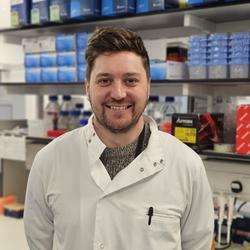Meet Early Career Microbiologist of the Year talk finalist: Alistair Tweedie

What are your current research interests?
My current research intersects virology and RNA biology, focusing on how herpesviruses interact with host RNA during viral infection. Specifically, how one protein produced by the virus may block host protein synthesis through the degradation of RNA, a key mechanism the virus uses to hijack translation and promote replication. Using a molecular virology approach, my project aims to elucidate how this viral protein functions, what it binds to, and how it degrades RNA. Not only does this research allow us to further understand herpesvirus biology, but it also provides a vital tool to explore fundamental RNA degradation mechanisms.
What advice would you share with someone interested in working in this field?
Getting into virology or even microbiology in general doesn’t necessarily have to be through traditional routes. What matters most is a keen interest and curiosity in science, while having an open mind about projects and direction as you develop in your career. My main piece of advice would be to really enjoy the work; technical skills can always be learned, but enthusiasm and motivation are vital. Finally, learn to tackle obstacles along the way. Things don’t always work the first time in science, so don’t be discouraged - instead, use the opportunity to hone your troubleshooting skills!
How did you feel finding out you are an Early Career Microbiologist of the Year finalist?
I was absolutely thrilled to hear that I had been selected to be a finalist, but also massively surprised! Having started out my career with more of an RNA/cell biology focus, it was great to have my current work and myself recognised within the microbiology field. For me, this recognition not only highlights the research that I am doing but also reflects the support and collaboration within our research group and the exciting science being carried out by other members of the lab.
What do you love most about your job?
One of the best things about working in this field is the variety. Each day is different to the last – one day could be investigating how a particular viral protein acts on its own in human cells, and the next might be studying how it behaves during a virus infection. There is also a real excitement in obtaining new data, and whether this will be promising or just confusing, either way, it will help move the project forward. Finally, the community. Having people around to celebrate results, troubleshoot ideas, or even talk nonsense over lunch really makes my job enjoyable.
How do Society events, such as Annual Conference, promote your professional development?
Annual Conference provides a fantastic environment for professional development. Personally, the opportunities to present my work there have not only provided a platform for me to gain valuable feedback, ideas and fresh perspectives for this research, but also helped me hone my communication and presentation skills for a broad audience. The community as a whole are hugely supportive, and it really provides an opportunity to network with members at all stages of their careers – both within my own specific field and beyond, opening opportunities for new ideas and collaborations.
You can find and follow Alistair on LinkedIn: Alistair Tweedie
